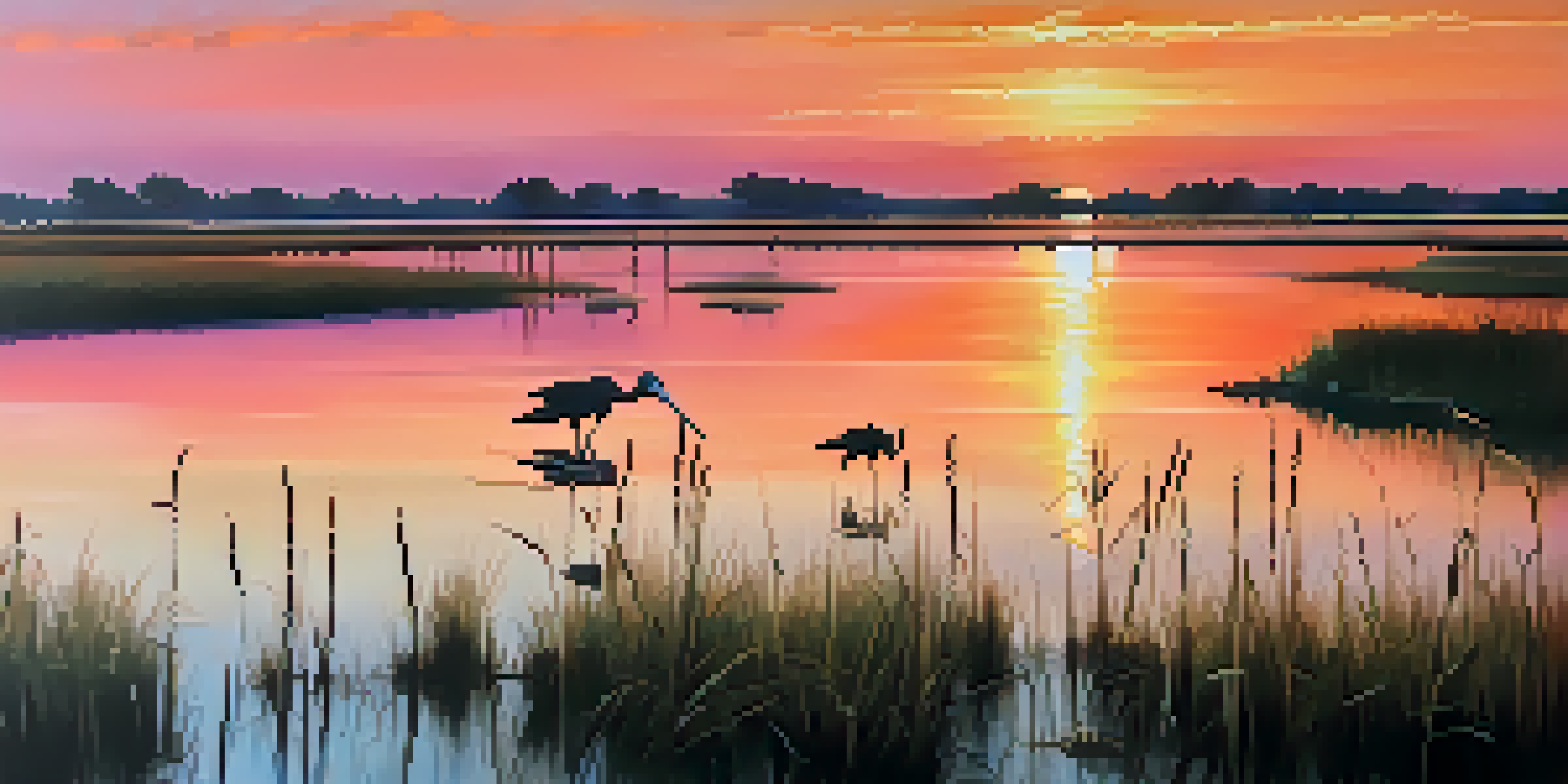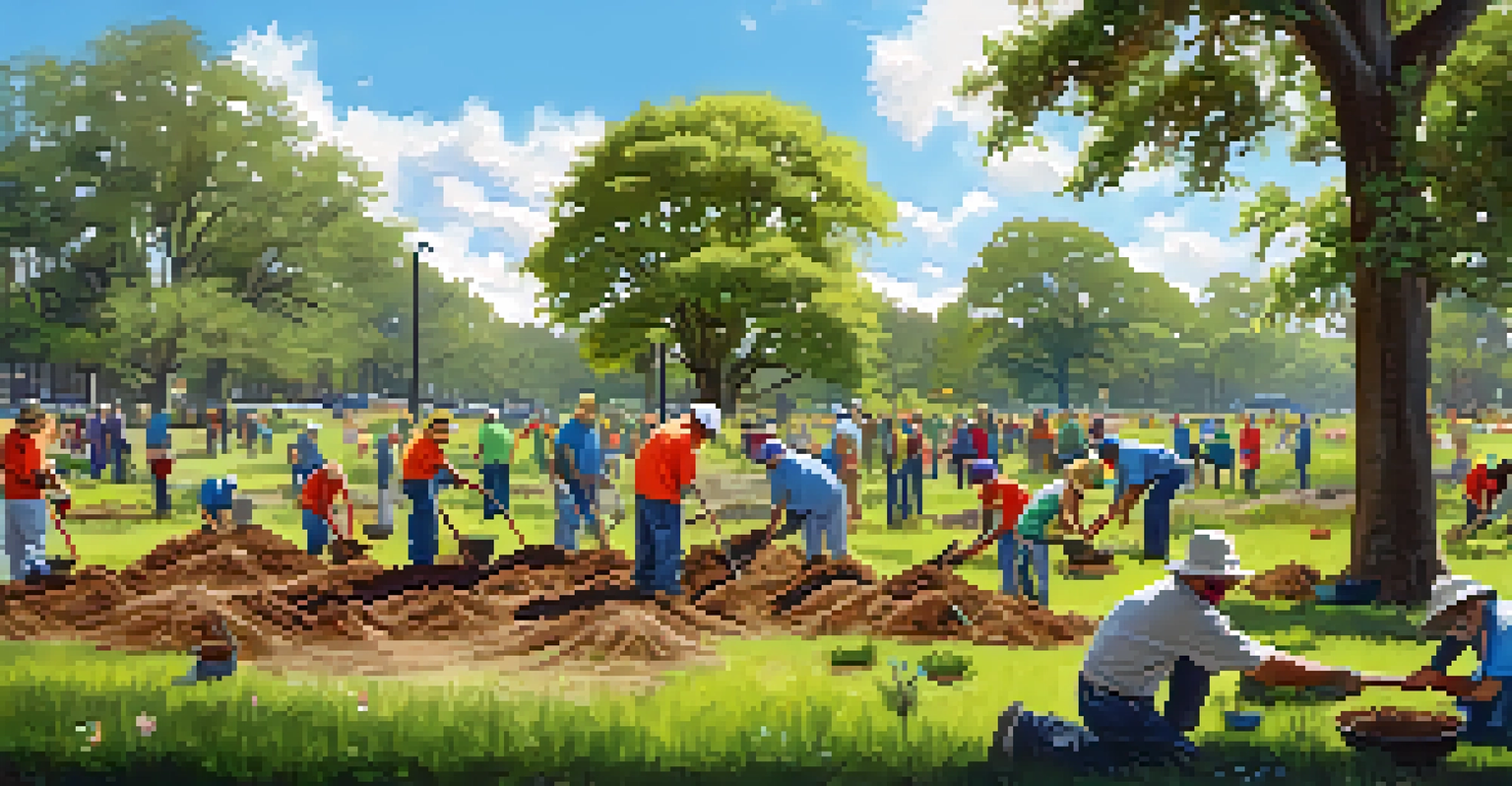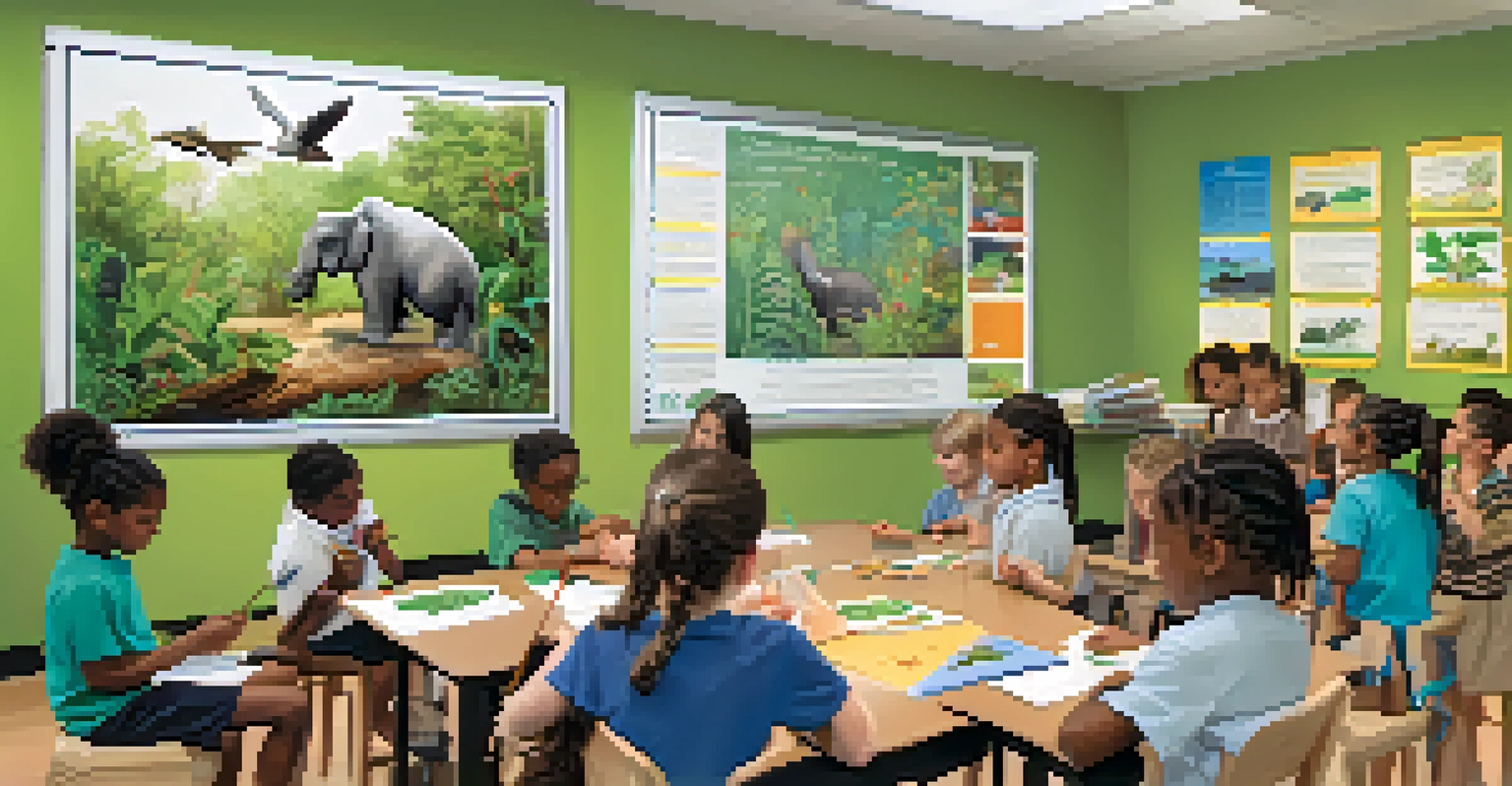The Role of Local Communities in Savannah's Ecosystem Care

Understanding Savannah's Unique Ecosystem
Savannah’s ecosystem is a rich tapestry of diverse habitats, including marshlands, forests, and coastal areas. Each of these environments plays a crucial role in maintaining the ecological balance, supporting wildlife, and providing resources for local communities. Understanding this intricate system is essential for effective conservation efforts, as it highlights how interconnected these habitats are.
The environment is where we all meet; where we all have a mutual interest; it is the one thing all of us share.
For example, the salt marshes along the coast serve not only as nurseries for fish but also as natural buffers against storm surges. When communities recognize the importance of these areas, they are more likely to engage in protective measures. This awareness fosters a sense of stewardship that is vital for preserving the environment for future generations.
Moreover, local flora and fauna are often tied to cultural identities and traditions, making their preservation even more significant. By valuing the ecosystem, Savannah’s residents can ensure that their heritage is also protected, creating a stronger bond between people and nature.
Community Engagement in Conservation Efforts
Local communities in Savannah actively participate in conservation initiatives, from beach cleanups to tree planting events. These hands-on activities not only improve the environment but also strengthen community ties and promote teamwork. When residents come together for a common cause, they forge relationships that enhance social cohesion.

For instance, organizations such as the Savannah Tree Foundation mobilize volunteers to plant native trees, which provide shade, improve air quality, and support local wildlife. This kind of involvement empowers individuals, making them feel like they have a stake in their environment. The more people engage, the more they understand the challenges faced by their ecosystems.
Community Engagement Drives Conservation
Active participation of local residents in conservation initiatives strengthens community ties and enhances environmental stewardship.
Additionally, community-led initiatives often highlight the importance of local knowledge and practices. By incorporating traditional ecological knowledge, residents can devise more effective conservation strategies tailored to Savannah's unique environment. This collaborative approach is key to fostering sustainable practices that benefit both the ecosystem and the community.
Education and Awareness: Key to Sustainability
Education plays a pivotal role in nurturing a community's sense of responsibility towards the environment. Schools and local organizations in Savannah often host workshops and seminars that inform residents about the ecological challenges facing their area. By equipping individuals with knowledge, they become more likely to take action in preserving their surroundings.
In every walk with nature one receives far more than he seeks.
For example, educational programs about the importance of wetlands can help residents understand how these areas filter water and provide habitat for wildlife. When people grasp the significance of such ecosystems, they are more inclined to advocate for their protection. This awareness can lead to increased participation in local governance and environmental decision-making.
Moreover, engaging youth in environmental education ensures that the next generation inherits a culture of sustainability. Programs that involve students in real-world conservation efforts inspire them to continue these practices into adulthood. This long-term commitment to ecological care solidifies the community's role in safeguarding Savannah's natural heritage.
Local Partnerships with Environmental Organizations
Collaboration between local communities and environmental organizations is crucial for effective ecosystem management. In Savannah, numerous non-profits work hand-in-hand with residents to tackle issues such as pollution, habitat loss, and climate change. These partnerships amplify the impact of conservation efforts, pooling resources and expertise for greater effectiveness.
For instance, the Coastal Conservation Association collaborates with local fishermen to promote sustainable fishing practices. By engaging the community in decision-making, these organizations ensure that conservation measures are relevant and widely supported. This collaborative spirit fosters a sense of ownership and accountability among community members.
Education Fuels Environmental Awareness
Educational programs empower residents with knowledge about ecological challenges, promoting proactive engagement in sustainability.
Furthermore, local businesses can also play a significant role by adopting eco-friendly practices and supporting community initiatives. When businesses prioritize the environment, it not only enhances their reputation but also encourages consumers to make more sustainable choices. This symbiotic relationship between businesses and communities is vital for the long-term health of Savannah’s ecosystem.
The Role of Local Government in Ecosystem Protection
Local governments in Savannah play an essential role in shaping environmental policies that protect the ecosystem. By implementing regulations that promote sustainable development and conservation, they can safeguard critical habitats. Effective governance also involves supporting community initiatives and providing funding for environmental programs.
For example, zoning laws can be designed to prevent overdevelopment in sensitive areas, ensuring that natural ecosystems remain intact. When residents see proactive measures taken by their local government, it encourages their participation in conservation efforts. This trust between the community and government is vital for fostering a collective responsibility towards the environment.
Moreover, local governments can serve as a bridge between the community and larger environmental organizations. By facilitating partnerships and providing resources, they can amplify the voices of residents in environmental discussions. This inclusion is key to creating policies that reflect the needs and desires of the community, ultimately leading to more effective ecosystem care.
Cultural Significance of Ecosystem Preservation
The cultural significance of Savannah’s ecosystem is deeply intertwined with the identity of its residents. Many local traditions and practices are rooted in the natural environment, making its preservation essential for maintaining cultural heritage. From festivals celebrating local wildlife to culinary traditions that highlight native ingredients, the ecosystem is a cornerstone of community identity.
For instance, the Gullah culture, rich in African heritage, is closely linked to the coastal environment and its resources. Understanding and preserving these cultural practices can enhance community pride and encourage more residents to engage in conservation activities. This cultural connection creates a powerful motivation for ecosystem care.
Cultural Heritage Tied to Ecosystem Care
The preservation of Savannah's ecosystem is essential for maintaining the cultural identity and traditions of its residents.
Moreover, storytelling and local art often reflect the beauty and importance of Savannah’s natural landscapes. By promoting these cultural expressions, communities can raise awareness about the need for environmental protection. Celebrating the intersection of culture and ecology fosters a more profound appreciation for the environment and inspires collective action.
Future Directions for Community-Led Ecosystem Care
Looking ahead, community-led initiatives will be vital in addressing emerging environmental challenges in Savannah. Climate change, habitat destruction, and pollution are pressing issues that require a concerted effort from local residents. By fostering a culture of environmental stewardship, communities can adapt and respond effectively to these challenges.
Encouraging innovative solutions, such as community gardens or wildlife corridors, can enhance biodiversity and promote sustainable practices. Additionally, utilizing technology for monitoring and reporting environmental changes can empower residents to take informed action. These forward-thinking approaches will ensure that the community remains resilient in the face of change.

Ultimately, the future of Savannah's ecosystem depends on the ongoing commitment of its residents. By nurturing a sense of responsibility, fostering partnerships, and celebrating cultural ties to the environment, communities can continue to play a pivotal role in ecosystem care. Together, they can create a sustainable future that honors both nature and community.